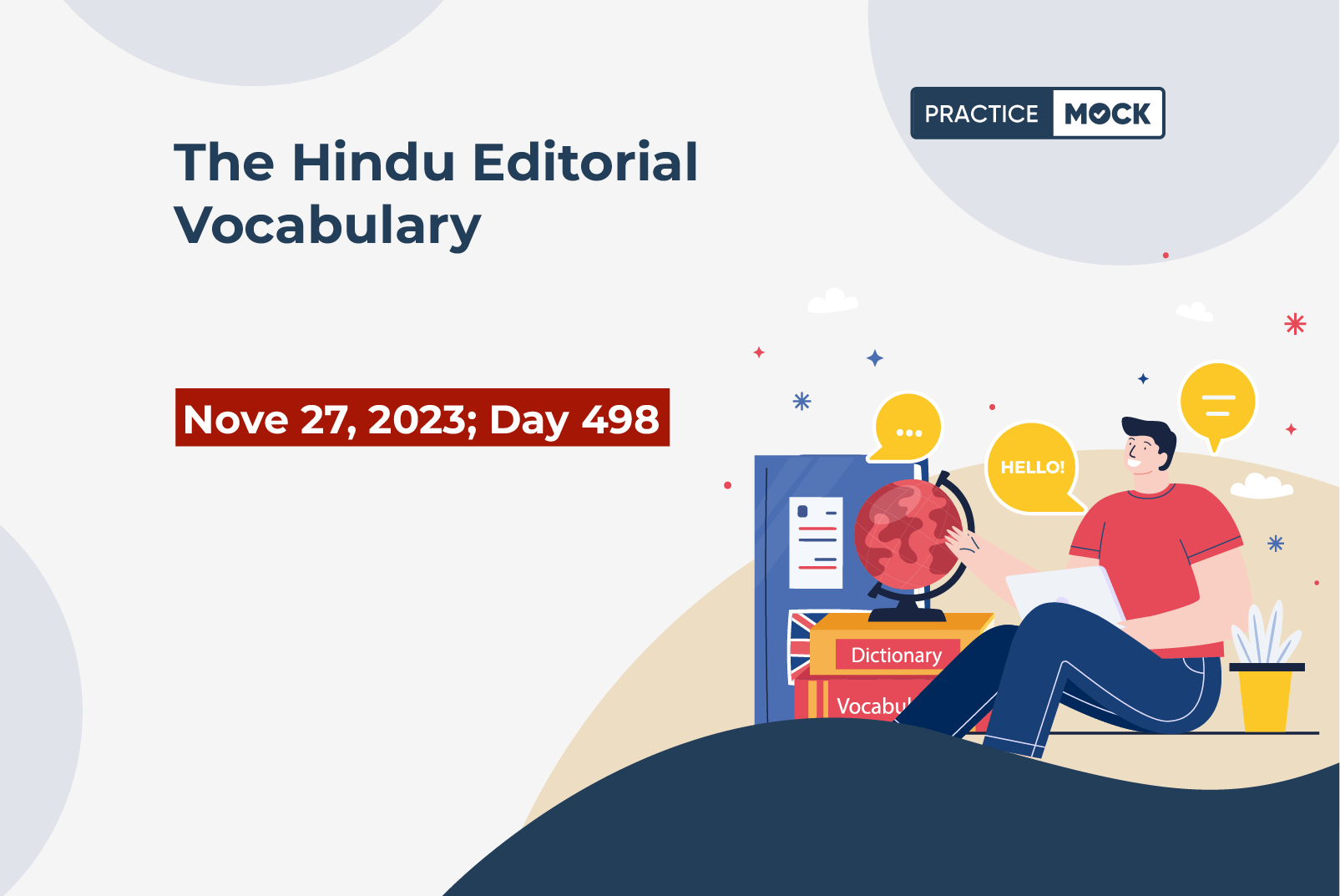| Difficult Word/ Phrase | Contextual Sense |
| Combat | Contest |
| Turn up | make a showing |
| Sporadic | Recurring in scattered and irregular or unpredictable instances |
| Leg | A section or portion of a course |
| Fervent | Characterized by intense emotion |
| Blitzkrieg | a short period characterized by an intense effort to do something or a large quantity of something arriving |
| Rebellion | Refusal to accept some authority, code or convention |
| Close rank | unite in order to defend common interests |
| Stem | Grow out of |
| Arsenal | A supply of something available for future use |
| Plank | an important principle on which the activities of a group, especially a political group, are based |
About three of four registered voters turned up (make a showing) to vote in the Assembly polls in Rajasthan on Saturday, a marginally higher proportion than in the 2018 elections and around the same as in 2013. Except for sporadic (Recurring in scattered and irregular or unpredictable instances) incidents of violence such as in Sikar, where minor stone-pelting was reported, the day passed peacefully. The last leg (A section or portion of a course) of campaigning in the State was fervent (Characterized by intense emotion) with both the ruling Congress and the opposition Bharatiya Janata Party (BJP) making frequent complaints of violations of the model code of conduct by the other. Prime Minister Narendra Modi led the BJP blitzkrieg (a short period characterized by an intense effort to do something or a large quantity of something arriving) in the last stretch and played up the anger and dissatisfaction among the Gujjars, who are reportedly upset with the Congress for side-lining Sachin Pilot. Mr. Modi said that the party’s treatment of Mr. Pilot, who had led an unsuccessful rebellion (Refusal to accept some authority, code or convention) to replace Ashok Gehlot as Chief Minister in 2020, amounted to insulting the Gujjars. Sensing the line of attack by Mr. Modi, Mr. Gehlot and Mr. Pilot closed ranks (unite in order to defend common interests) in the final days of campaign. Whether their laboured show of unity that sought to stem (Grow out of) the resentment among the Gujjars against the Congress bears fruit will be known on December 3, when the votes are counted.
Mr. Gehlot’s arsenal (A supply of something available for future use) included his welfare regime, the centre piece of which is the promise of a health cover of ₹50 lakh to all; his stress on Rajasthani regional identity; and his call for communal amity in the State. The last day of campaigning saw Mr. Gehlot change his social media profile picture to one of him holding a map of Rajasthan close to his chest. This serves to underscore the importance of the State’s language and culture, which, according to him, are threatened by the increasing dominance of the BJP’s Hindutva politics that advances national uniformity across all fields of human activity. Mr. Gehlot attempted to break the electoral pattern of a State that has a habit of voting out the incumbent in each election. The BJP started with the advantage of the State’s electoral pattern, and played the caste and religious cards to its advantage. It questioned the Congress’s welfare plank (an important principle on which the activities of a group, especially a political group, are based) and accused it of appeasing minorities. Mr. Modi brought up Congress ally DMK’s critique of Sanatana Dharma as a “threat to Rajasthan’s culture”. The BJP remained confident of winning comfortably, entirely on the strength of Mr. Modi’s popularity and its Hindutva plank. Whatever may be the outcome, the two national parties will have learned a lot from an intense contest in Rajasthan.
Want to improve your vocabulary further? Download the Lists of Word-Meanings of Previous Months here.
- Sign Up on Practicemock for Updated Current Affairs, Free Topic Tests and Free Mini Mocks
- Sign Up Here to Download Free Study Material
Free Mock Tests for the Upcoming Exams
- IBPS PO Free Mock Test 2024
- RBI Grade B Free Mock Test 2024
- IBPS SO Free Mock Test 2024
- NABARD Grade A Free Mock Test 2024
- SSC CGL Free Mock Test 2024
- IBPS Clerk Free Mock Test 2024
- IBPS RRB PO Free Mock Test 2024
- IBPS RRB Clerk Free Mock Test 2024
- RRB NTPC Free Mock Test 2024
- SSC MTS Free Mock Test 2024
- SSC Strenographer Free Mock Test 2024
- GATE Mechanical Free Mock Test 2024
- GATE Civil Free Mock Test 2024
- RRB ALP Free Mock Test 2024
- SSC CPO Free Mock Test 2024
- AFCAT Free Mock Test 2024
- SEBI Grade A Free Mock Test 2024
- IFSCA Grade A Free Mock Test 2024
- RRB JE Free Mock Test 2024
- Free Banking Live Test
- Free SSC Live Test


